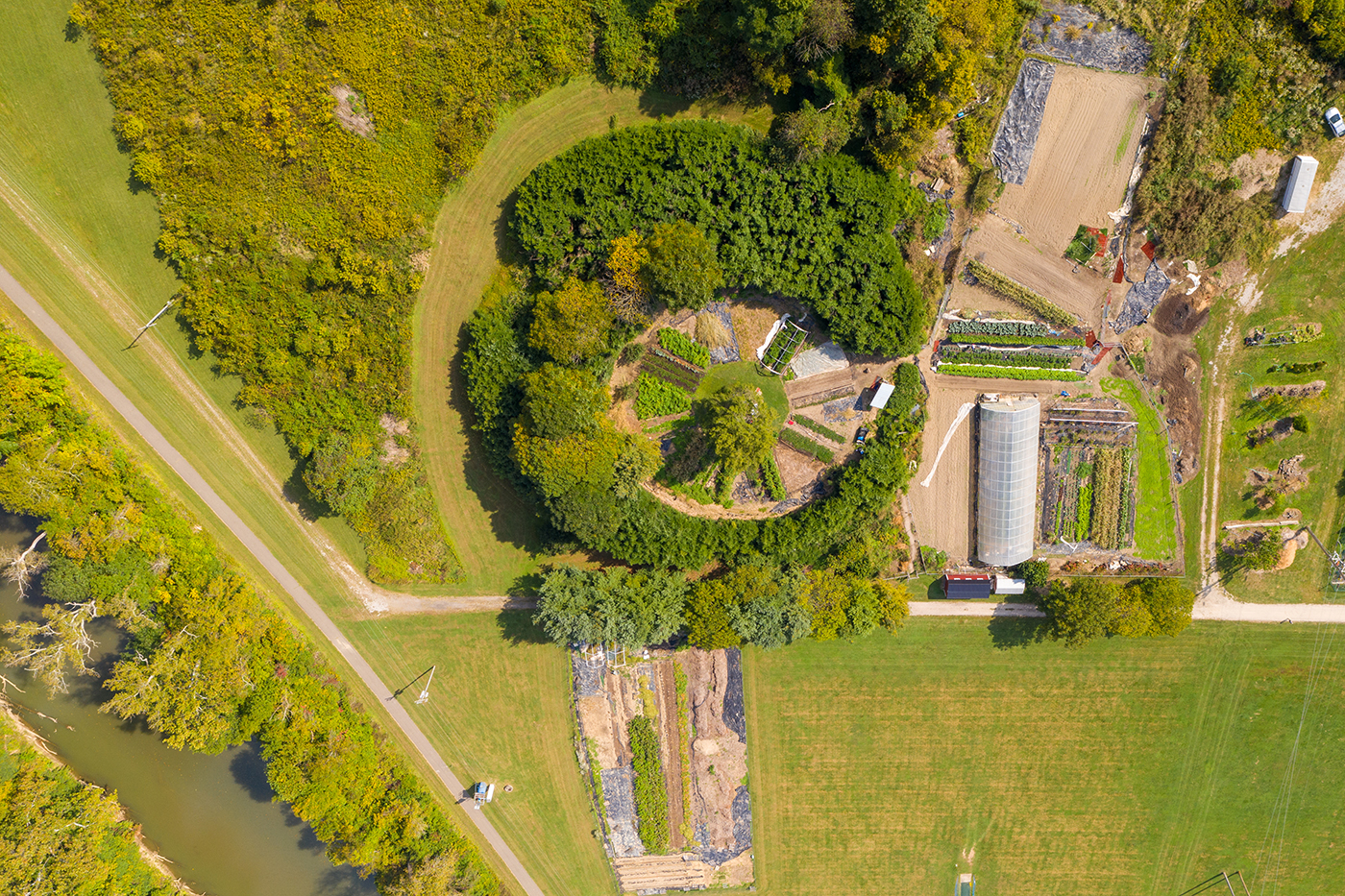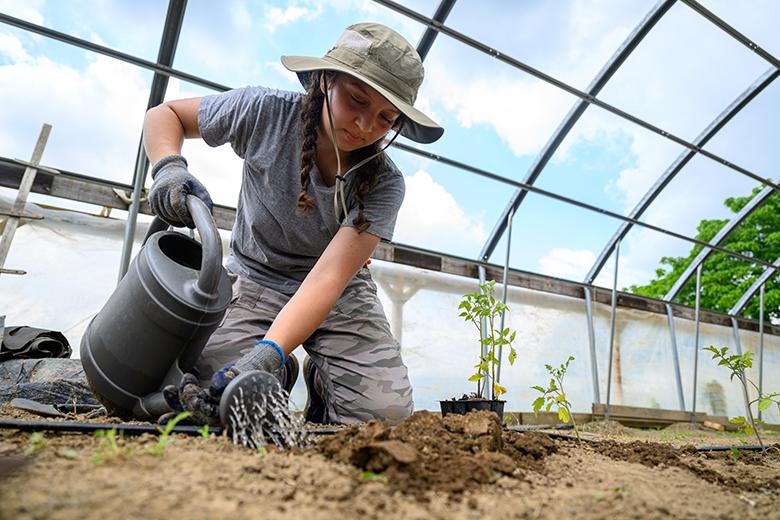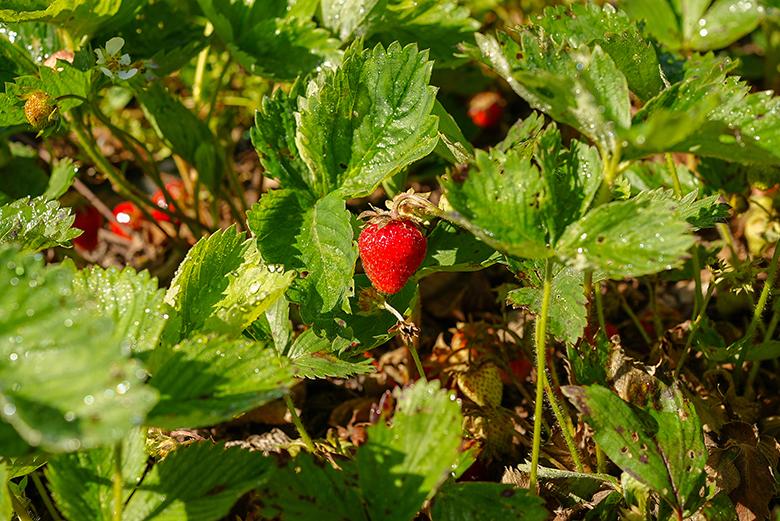Do you know where your food comes from? Have you considered the work it took to grow and how it arrived on your favorite store’s shelf?
Modern grocery stores often obscure the long journey some food takes to get from farm to the table. With the help of dedicated faculty, student interns and volunteers, the OHIO Student Farm demonstrates the value of local, sustainable agriculture—and how it continues to benefit the University and its surrounding communities.
The OHIO Student Farm (opens in a new window), managed by the Environmental and Plant Biology department (opens in a new window) within the College of Arts and Sciences (opens in a new window), is a unique resource located on West State Street within the Ohio University Research & Enterprise Green, only a five-minute shuttle ride from Baker University Center (opens in a new window). The farm is a place where those who are passionate about farming and agriculture can learn, research and reap fresh produce in the process. The oldest part of the farm was created more than 40 years ago. It has since expanded to include approximately two acres in total including outdoor classrooms, learning gardens, student garden plots and a high tunnel—a structure resembling a greenhouse that extends the growing season for certain crops.
An experience rooted in academics and hands-on learning
The primary goal of the student farm is education. Students from a variety of programs, across multiple colleges utilize the designated experiential learning space (opens in a new window) for several functions. Classes in subjects like food studies, medicinal plants, nutrition, physiological ecology, plant biology, sustainable agriculture and more are involved with the farm. Internships at the farm are also available to students in the spring, summer and fall.
“Being on the main part of campus is enjoyable, but this is a totally different experience,” said Claire LeMelle, an OHIO Student Farm intern and second-year student majoring in anthropology and philosophy. “We have somewhere that is a local farm but also meant just for learning, so students can not just go see a farm but learn anything they want to there.”
The student farm has no full-time staff and is primarily managed by Associate Professor Emeritus and volunteer Arthur Trese and Farm Manager Tony Noble, whose position is funded by a grant from the U.S. Department of Agriculture (USDA) and nonprofit Rural Action (opens in a new window). Trese took over the farm when it was much smaller and still called the learning garden. Over time, he honed his passion to create something bigger and expand what is now the OHIO Student Farm. Nearly all activities on the farm are funded directly from its produce sales. Students also learn the business side of agriculture by selling the produce they grow.
“The OHIO Student Farm really is operating as a small business,” said Trese. “We grow the same kind of produce most local produce farmers grow, that you would grow in a garden any given time of year in Ohio, and then we sell it to local restaurants; we sell some to the University and then we sell some at the Chesterhill Produce Auction.”
OHIO Student Farm interns are given class credit or stipends funded from the farm’s produce sales for their work. Funding from a USDA Capacity Building Grant to the Ohio University Environmental and Plant Biology Department also helps support internships. Interns inherit Trese’s passion for the student farm and enjoy learning from experienced mentors in a hands-on setting.
“People don’t know how rewarding the work is until they do it,” said Kaya Stone, an OHIO Student Farm intern and fourth-year student studying environmental science and sustainability. “I know outside work is not for everyone, but it’s beautiful here and it’s really nice to wake up and know that you’re going to work at a place where everyone is putting in 100% and it inspires you to put in 100%. Art and Tony really care about teaching us; it’s nice to learn from someone who’s so passionate and has so much experience.”
Experiences beyond the classroom
Beyond class credit and internship experience, students who work on the farm are imparted with high standards of producing quality foodstuffs. The entire student farm is Good Agricultural Practices (GAP) certified (opens in a new window) by the USDA, meaning fruits and vegetables are voluntarily produced, packed, handled and stored to minimize risks of microbial food safety hazards. GAP practices ensure traceability of food from source to sink. Students also work in the USDA certified organic (opens in a new window) portion of the farm and learn the rigor of producing organic food and the nuances of the organic certification process. Additionally, the OHIO Student Farm provides many students with a different outlook on how food systems function and where food comes from.
“The education component and why that matters from where I'm sitting is that I didn't know where my food came from when I grew up. The experience is the same for many students—they went to the grocery store. That's where food came from,” said OHIO Student Farm Coordinator and Associate Professor of Plant Biology David Rosenthal. “And so, the promoting of the student farm and what it does is to really give students some grounding in where their food comes from and an understanding of what it takes to grow food on a relatively small scale in a diversified, sustainable farm.”
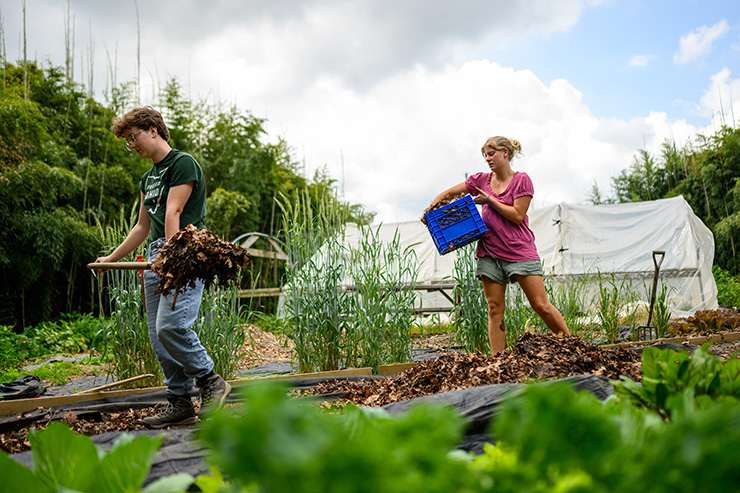
OHIO Student Farm Interns Lindsey Copeland (left) and Kaya Stone (right) spread leaf compost sustainably collected from University landscaping.
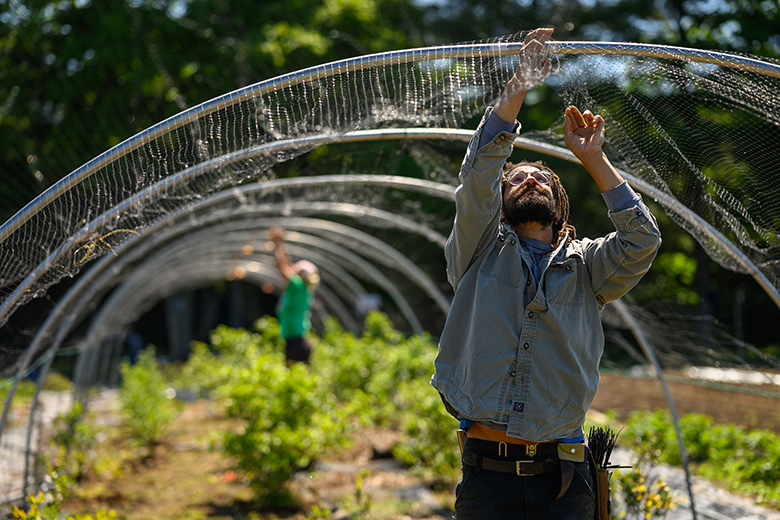
OHIO Student Farm Manager Tony Noble (foreground) and a Student Farm intern hang netting over crops.
Increasing access to sustainably grown food
Through education, the OHIO Student Farm produces an impressive amount of food. The farm operates in spring, summer and fall and grows different fruits and vegetables throughout the different growing seasons. In contrast to larger, industrial monoculture farms, the diversity of crops found on the student farm means the production scale is smaller; however, the variety of fruits and vegetables is incredible. The farm grows more than two dozen different kinds of plants, including, but not limited to:
- Arugula
- Blueberries
- Blackberries
- Broccoli
- Cabbage
- Carrots
- Eggplant
- Fennel
- Garlic
- A variety of herbs
- Hops (used in OHIO’s Craft Brewing Certificate (opens in a new window) courses)
- Kale
- A variety of lettuce
- Peppers
- Potatoes
- Radish
- Raspberries
- Spinach
- Squash
- Strawberries
- Tomatoes
- Wheat
With the wide array of produce available, there are crops that cater to every taste. Many of the fruits and vegetables grown at the farm make their way to Ohio University students. Being GAP certified allows the Student Farm to sell produce directly to Ohio University Culinary Services (opens in a new window) during the school year. This food ends up feeding students at dining halls and markets around campus. In 2023, Culinary Services purchased more than 900 pounds of local, sustainably grown produce from the OHIO Student Farm, according to Culinary Services’ Procurement and Contracts Manager Jeff Augsburger.
“We are a proud supporter of the student farm and consider them a great University partner,” said Augsburger.
Ohio University students can access additional Student Farm goods through the Student Farmers Market. Every fall semester a team of volunteers sells produce from the farm to students at or below market price. The Farmers Market has been in Baker University Center in years past but will likely move to the Grover Center Atrium this fall. Any leftover food is donated to Cat’s Cupboard (opens in a new window), OHIO’s food pantry. The student farmers market was started by recent Honors Tutorial College (HTC) (opens in a new window) and Environmental Studies (opens in a new window) graduate Kate Harmon, AB '24, with the goal of increasing students’ access to local, sustainably grown food, especially those living on campus.
“Our main goal was to provide access, not make a profit,” said Harmon. “The overall concept of my thesis is to research the benefits of sustainable agriculture and local food and specifically how the student farm can provide those benefits to students within our campus community.”
Harmon worked with her thesis advisor Rosenthal and others to continue to engage like-minded students about sustainable agriculture. In addition to the farmers market, Harmon also started Ohio University Student Farmers Club last spring semester. The club provides students with farm tours, workshops, volunteer opportunities and a sense of community surrounding sustainable agriculture. As the club’s advisor, Rosenthal says it is his goal to keep students engaged and involved in the club and sustainable practices in the area. Harmon has similar thoughts.
“Another thing that came from my thesis was starting a club for students who are interested in local food and getting engaged with the student farm and other local farms in the community,” explained Harmon. “We’ve toured a bunch of local farms, volunteered on the student farm and just kind of have been a community for students who are interested in these issues.”
Community impact
Through selling produce to local businesses and working with Southeast Ohio nonprofit organizations, the OHIO Student Farm has established intimate connections with the city of Athens and surrounding communities (opens in a new window). The student farm provides fresh, sustainable produce to local businesses and restaurants including but not limited to Jackie O’s, Kindred Market, Little Fish, Salaam and The Village Bakery. The farm contributed 8,700 pounds of produce to the local food system in 2022 alone.
Students also sell fruits and vegetables at the Chesterhill Produce Auction (opens in a new window), a social enterprise and food hub of the nonprofit Rural Action (opens in a new window). The auction connects the community by providing local farmers with a venue to sell their food to thousands of customers throughout Appalachian Ohio, West Virginia and other parts of Ohio.
Dr. Trese developed many of these community relationships before his retirement and his continued dedication to the farm through volunteering has helped the student farm maintain these connections.
“It gradually developed with my class; we had a farm that was something more than just a little garden. As it expanded, we really wanted people to come see,” said Trese. “We did tours here, we did workshops here, I was really able to connect with a lot of the local farming community.”
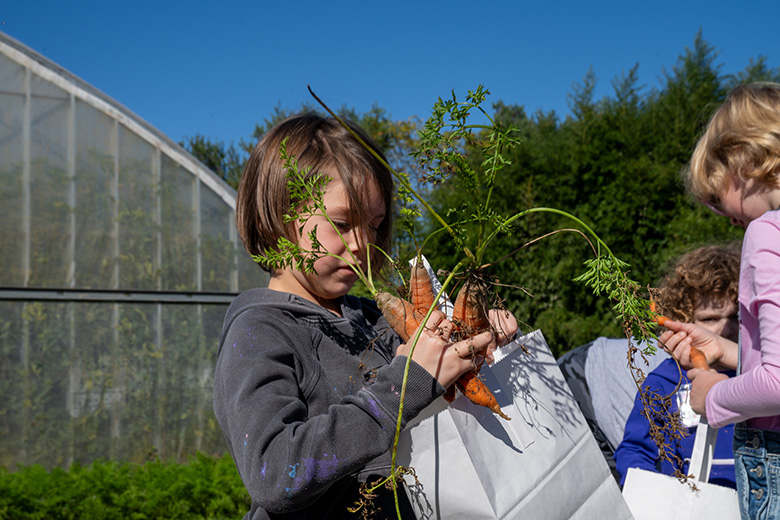
An Athens-area first-grade student holds carrots harvested from the OHIO Student Farm as part of Community Food Initiatives' Sprouts program.
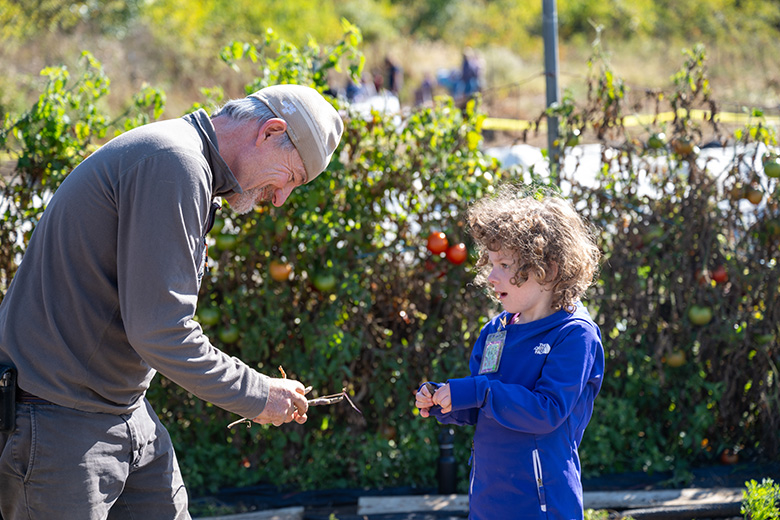
Dr. David Rosenthal often gives tours of the OHIO Student Farm and helps younger students like those in the Sprouts program engage in hands-on lessons.
The student farm often works with nonprofits to host tours, workshops and other community events. OHIO Student Farm Coordinator David Rosenthal works with Community Food Initiatives (opens in a new window) Director of Garden Education Molly Gassaway and other entities like Live Healthy Appalachia (opens in a new window) to organize field trips to the farm for students as young as the first grade. Students on these trips engage in hands-on lessons, harvest produce and learn about the importance of agriculture and the environment.
While the student farm continues to impact the Athens and Ohio University communities, those involved are working to secure its future. The grant-funded position of farm manager expires in 2025; however, there are plans to support Noble and possibly more interns with additional grant funding from the USDA and others. Rosenthal also says he has received departmental support for the time he spends working on and administering the farm and classes associated with the farm.
To ensure the farm’s longevity, Rosenthal and Trese would like to work toward the goal of creating a permanent farm manager position. Trese’s hope is that a portion of this position could be paid out of revenue from produce the farm sells. Personnel exclusively dedicated to teaching at the OHIO Student Farm would make certain it will continue educating students and churning out sustainable produce for years to come.
To learn more about the OHIO Student Farm or to get involved, visit: https://www.ohio.edu/cas/plant-biology/research/facilities-laboratories/ohio-student-farm (opens in a new window)

